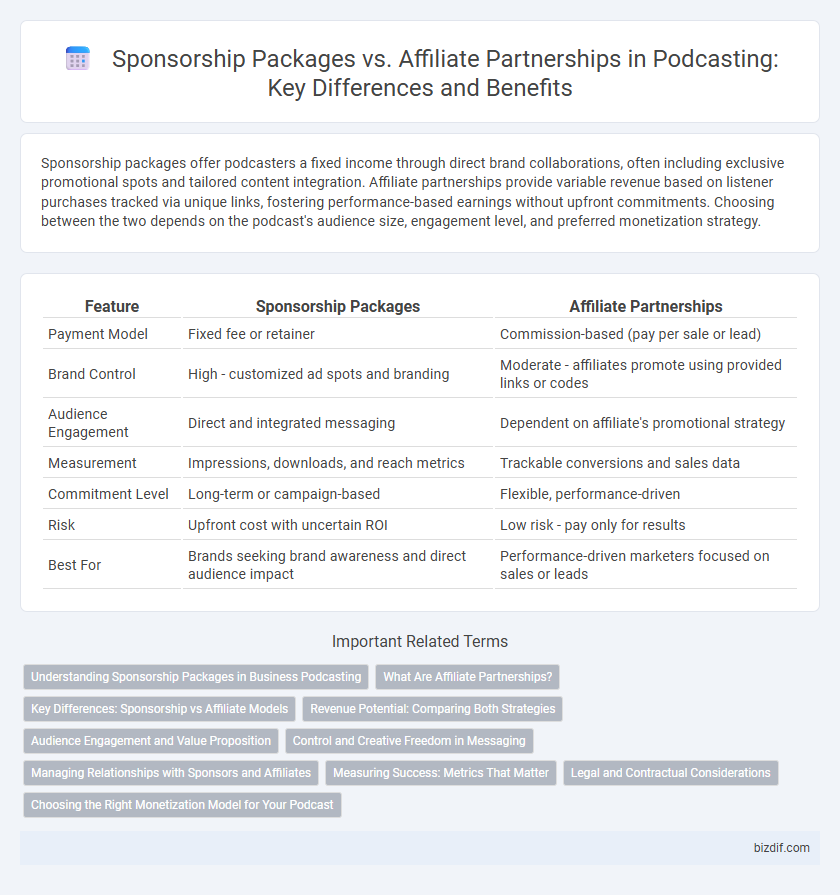Sponsorship packages offer podcasters a fixed income through direct brand collaborations, often including exclusive promotional spots and tailored content integration. Affiliate partnerships provide variable revenue based on listener purchases tracked via unique links, fostering performance-based earnings without upfront commitments. Choosing between the two depends on the podcast's audience size, engagement level, and preferred monetization strategy.
Table of Comparison
| Feature | Sponsorship Packages | Affiliate Partnerships |
|---|---|---|
| Payment Model | Fixed fee or retainer | Commission-based (pay per sale or lead) |
| Brand Control | High - customized ad spots and branding | Moderate - affiliates promote using provided links or codes |
| Audience Engagement | Direct and integrated messaging | Dependent on affiliate's promotional strategy |
| Measurement | Impressions, downloads, and reach metrics | Trackable conversions and sales data |
| Commitment Level | Long-term or campaign-based | Flexible, performance-driven |
| Risk | Upfront cost with uncertain ROI | Low risk - pay only for results |
| Best For | Brands seeking brand awareness and direct audience impact | Performance-driven marketers focused on sales or leads |
Understanding Sponsorship Packages in Business Podcasting
Sponsorship packages in business podcasting offer structured promotional opportunities with set deliverables, including ad reads, host endorsements, and branded segments designed for consistent audience engagement. These packages provide predictable revenue streams and clear ROI metrics, making them preferable for brands seeking long-term association and brand alignment with podcast content. Unlike affiliate partnerships focused on performance-based commissions, sponsorships emphasize brand visibility and strong listener trust through curated messaging.
What Are Affiliate Partnerships?
Affiliate partnerships in podcasting involve promoting products or services where podcasters earn commissions based on sales or leads generated through unique referral links or codes. Unlike sponsorship packages that offer fixed payments for ad spots, affiliate partnerships provide performance-based revenue, aligning incentives between advertisers and creators. This model allows podcasters to monetize their audience authentically by recommending relevant products that resonate with their listeners.
Key Differences: Sponsorship vs Affiliate Models
Sponsorship packages in podcasting typically involve fixed fee agreements where brands pay a set amount for ad placements, often including host-read ads or branded segments, ensuring predictable revenue streams for podcasters. Affiliate partnerships rely on performance-based payments, with podcasters earning commissions from sales or leads generated through unique tracking links, emphasizing measurable ROI for advertisers. The key difference lies in sponsorships offering brand visibility and consistent income, while affiliates prioritize conversion-driven marketing with variable earnings.
Revenue Potential: Comparing Both Strategies
Sponsorship packages offer predictable, upfront revenue through fixed fees negotiated per episode or season, providing financial stability for podcasters. Affiliate partnerships generate income based on performance metrics like clicks or sales, often resulting in higher long-term revenue potential but with variable payouts. Evaluating audience size and engagement is crucial to maximize returns from either strategy in podcast monetization.
Audience Engagement and Value Proposition
Sponsorship packages offer podcasters a tailored approach to audience engagement by integrating branded content that aligns closely with listener interests, enhancing perceived value and trust. Affiliate partnerships leverage performance-based incentives, driving direct consumer actions while providing measurable ROI and transparent metrics for value assessment. Both models prioritize authentic connection, but sponsorships often deliver greater long-term brand affinity, whereas affiliate partnerships excel in immediate conversion tracking.
Control and Creative Freedom in Messaging
Sponsorship packages offer podcasters greater control and creative freedom in messaging by allowing customized ad content and exclusive brand integration tailored to the show's unique style. In contrast, affiliate partnerships often require standardized promotional scripts and limit message customization to align closely with the brand's overarching campaign guidelines. This distinction impacts how authentically the podcaster can connect with their audience while maintaining brand integrity.
Managing Relationships with Sponsors and Affiliates
Sponsorship packages require personalized communication, clear deliverables, and regular performance updates to maintain strong, long-term relationships with sponsors, ensuring mutual brand alignment. Affiliate partnerships demand consistent tracking, transparent commission structures, and timely reporting to foster trust and maximize revenue potential. Both approaches benefit from proactive engagement and responsiveness to evolving goals and feedback.
Measuring Success: Metrics That Matter
Sponsorship packages offer fixed metrics such as reach, frequency, and listener demographics to gauge campaign impact, while affiliate partnerships rely heavily on conversion rates and tracking sales through unique links or promo codes. Key performance indicators (KPIs) like click-through rates, cost per acquisition (CPA), and return on investment (ROI) provide measurable insights for affiliate success, whereas sponsorships focus more on brand awareness and audience engagement metrics. Understanding these distinctions helps podcasters select partnerships aligned with their goals and optimize revenue streams effectively.
Legal and Contractual Considerations
Sponsorship packages in podcasting often require detailed contracts outlining deliverables, payment terms, and usage rights to protect both parties legally, whereas affiliate partnerships typically involve simpler agreements focused on commission structures and disclosure requirements. Legal considerations for sponsorships include intellectual property rights, exclusivity clauses, and liability limitations, while affiliates must adhere to Federal Trade Commission (FTC) regulations on transparent advertising and proper reporting. Both models demand clear contractual language to mitigate risks and ensure compliance with advertising and consumer protection laws.
Choosing the Right Monetization Model for Your Podcast
Sponsorship packages offer set payments based on ad placements, providing predictable podcast revenue streams and direct brand collaborations. Affiliate partnerships enable earning commissions through promoted products, ideal for podcasts with niche audiences and strong listener trust. Evaluating audience size, engagement, and content alignment helps determine the optimal monetization model for sustainable podcast growth.
Sponsorship packages vs Affiliate partnerships Infographic

 bizdif.com
bizdif.com